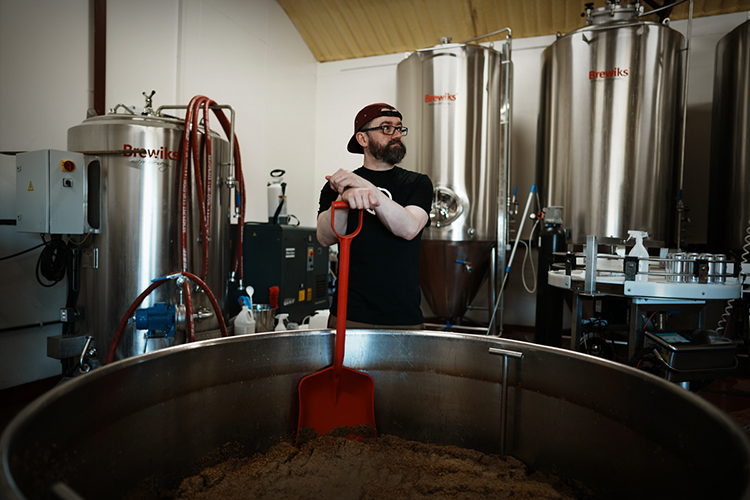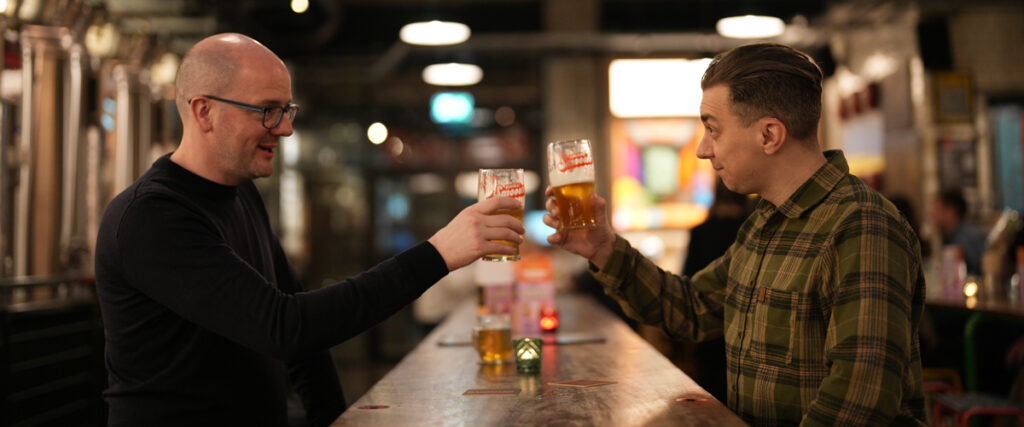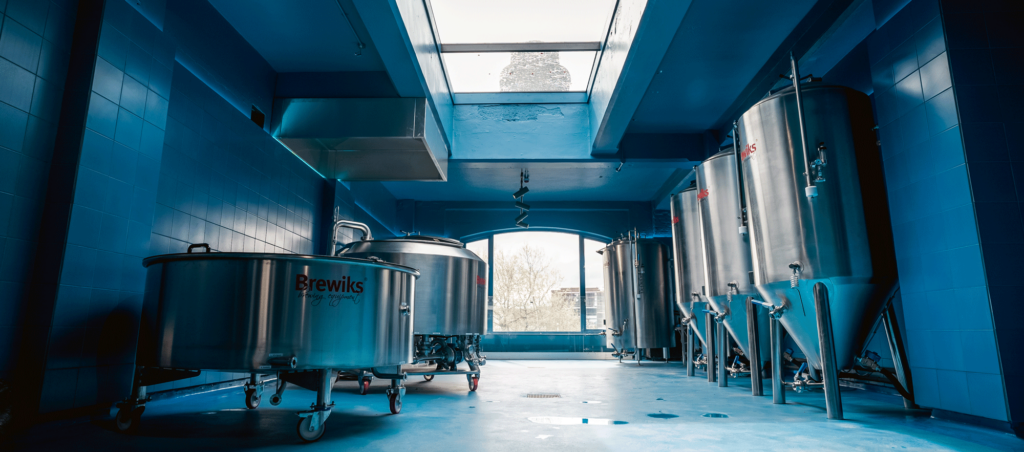
Lately, I’ve been pouring over data from the mid 70s to the early 90s trying to make sense of how Britain’s historic brewing legacy was seemingly wiped off the face of the Earth. More importantly, I’ve been studying the similarities between the beer market of 50 years ago, and what I consider to be the highly anti-competitive, legislation fraught beer industry of today. My fear is that if we continue on our present course we are doomed to repeat ourselves. If we don’t correct it, the casualty will be 100s more independent breweries, and what we as consumers get to choose at the pub, or in the supermarket.
To understand how we got here, first we need to revisit Britain’s recent brewing past, and look at how one failed attempt to break up a previous brewing monopoly got us in the position we now find ourselves in.
On the one side you had a group of breweries that were once collectively referred to as “The Big Six”. These consisted of Allied Breweries (Tetley, Ansells and Ind Coope), Bass Charrington, Courage, Scottish & Newcastle, Whitbread and Watney Mann. On the flipside, in 2025 we’ve witnessed the emergence of what has now amounted to approximately 1700 independent breweries, from the very small, to the quite-big-actually. Most curiously, none of the former exist any longer—or at least not as breweries. Whitbread, for example, is perhaps best known as the owners of Premier Inn, and as the founders of Costa Coffee (a brand now owned by Coca-Cola).
How did these home-grown brands disappear from the majority of British bars, instead being replaced by identikit brands imported from Canada, the US and Europe, which were then repackaged and subsequently sold back to us as part of our own, intangible beer heritage? It’s a funny story, because in terms of the ebb and flow of independent British brewing, it looks like history seems to be on a course to repeat itself.
On a recent pub visit with my Mum, who isn’t much of a drinker but enjoys a half of Moretti from time to time, I asked her if she remembered brands like Ind Coope and Watney’s. Born in the mid-50s, she very much does. But when I asked her if she’d ever considered how they gradually vanished from pubs and bars around the country in the early 1990s, she gave me a puzzled look. It’s not something she’d ever really thought about, but she then remarked how funny it was that these were, slowly but surely, erased from bar tops around the country.
What’s perhaps most interesting about this is that the opposite was supposed to happen.
By the end of the 1980s there were just 220 breweries operating in the UK. To put this in perspective, in 1915 there were around 3500, and by 1939 there were less than 900. So what happened? The Big Six emerged in earnest during the postwar era, itself a product of the Industrial Revolution, when large breweries opened from the late 18th century onwards to satisfy the growing demand from thirsty workers. These monolithic mega-companies gradually swallowed up regional breweries, from the likes of Wilson’s in Manchester, Truman’s in London and countless more besides. If they weren’t absorbed, they were simply closed down for good.
As the Big Six breweries grew the size and value of their portfolios, so too did they absorb the massive pub estates that each of their acquisitions had spent decades investing in. By the time Whitbread acquired Boddington’s of Manchester in 1989, for example, it had amassed 520 pubs across its northwestern homeland. As more pubs became part of more estates, so too did the size and influence of their owners. By the end of the 1980s these six breweries controlled 90% of the beer market in Great Britain.
Fearing the negative effects this monopoly was having on a social, commercial and cultural level, the then Conservative government—led by one Margaret Thatcher—introduced new legislation in a conscious effort to manage it. Known as the ‘Beer Orders,’ it meant that brewing companies operating within Great Britain were now limited to owning a maximum of 2000 leased or managed pubs within their estates.
It also introduced a law called the ‘Guest Beer Provision.’ This meant that all leased and managed pubs were legally required to stock at least one guest cask beer, while also removing the tie on non-alcoholic drinks in its entirety. The hope from the government was that each of the brewing giants would sell off vast swathes of their tied houses, creating more pubs that were free of tie, and concentrate on their brewing. And yet, the opposite happened.

Instead of breaking up these massive pub chains, the Big Six decided to sell off their breweries and concentrate on their far more profitable hospitality businesses. After being passed from pillar to post, Allied Breweries eventually became part of the Molson Coors family of brands. Bass Charrington is now owned by the world’s largest brewer, Anheuser-Busch InBev, as is the aforementioned Whitbread. Scottish and Newcastle is today part of the Heineken stable, and the entity that in 2025 became Carlsberg Britvic owns the rights to the Courage Brands. Interestingly, Watneys collapsed in 1979, and although a revival was attempted in 2019, it mostly exists as an ephemeral memory. Manns? That brand also went to the Danes at Carlsberg.
What happened next was a slow blooming of very small independent breweries throughout the 1990s. Brands like Roosters, Black Sheep, Kelham Island, and Marble gradually started popping up, largely as a result of the newly improved access to market. By the turn of the century the number in operation had more than doubled to around 400, but it would be the next piece of government legislation that broke the dam to start the tidal wave.
While access to market had been improved, small breweries still massively struggled to compete with their larger counterparts due to the economies of scale. Small breweries cannot buy discounted ingredients in bulk, or afford costly, labour saving equipment (or indeed extra staff) that helps bring their total overheads down. To counter this imbalance, in 2002, Tony Blair’s Labour government and then chancellor Gordon Brown introduced a new law called Progressive Beer Duty (PBR, sometimes referred to as Small Brewers Relief, or SBR.) Simply, PBR meant smaller brewers paid half the beer duty of their larger counterparts, and once they hit a certain size the amount of duty they paid increased, until at a certain size they no longer qualify for a discount.
While PBR and the Beer Orders are not the same thing, they are two sides of the same coin—or perhaps more accurately, two sharpened edges on opposing sides of the same blade. As it finished being swung at the red tape in one direction, soon it was brandished in another. Despite the launch of PBR and the opportunity to build a stable industry for the new breweries who might take advantage, in 2003 it was considered that the beer market was once again competitive, and so the beer orders were rescinded. And it’s true that there was a lot more market access, both within pubs, and in the off trade, which was growing rapidly as an increasing number of people chose to drink at home. But in the background the same old multinationals were slowly, but surely, up to their old tricks again.
The effect of PBR is something for the history books. Coinciding almost perfectly with the fervour generated by the emergence of the US craft beer industry, it gave rise to 1000s of new British breweries. In fact, according to my data it peaked at 2426 in 2022.
Hold on a second. Didn’t I say there are now 1700 independent UK breweries at the start of this article? You might, correctly, be wondering what the hell happened to cause such a stark decline. And while the Covid-19 pandemic and the resulting debts generated by business loans issued during this period have had a very obviously negative impact, behind the scenes something far more sinister has been going on. Access to market and fair trading conditions for smaller breweries have gradually been eroded by the largest players in the industry, and without anything like the Beer Orders in place, there isn’t really anything to be done to stop them from doing so.
Instead of the Beer Orders causing the accountants to retreat back to their breweries and lick their wounds, it is widely regarded that it was the main catalyst in the formation of giant pub companies, often referred to as PubCos. Some of these existed before the Beer Orders, such as Mitchell and Butlers, which was founded in 1898, and today operates more than 1700 pubs and restaurants across the UK. Others were founded only after the Beer Orders were rescinded. Stonegate, the UK’s largest PubCo, was established in 2010 with a modest portfolio of 333 pubs. Following various mergers and acquisitions, Stonegates portfolio now consists of a—frankly ridiculous—4500 properties.

Some of the global brewers who absorbed various chunks of the Big Six also invested in hospitality sites. When Heineken bought Scottish & Newcastle, it also acquired its pubs. Following the rollback of the Beer Orders, it currently has around 2700 houses under its Star Pubs & Bars subsidiary.
But it’s not just the mass control of vast swathes of pubs that is causing small breweries problems. Beginning with the acquisition of Camden Town Brewery by AB InBev in 2015, the largest brewing companies then began to assemble a small range of brands that fit in with modern drinkers sensibilities. Heineken cherry picked Beavertown and Brixton Brewery, while Asahi swooped in and picked up one of the icons of traditional British brewing, Fullers, in a move highly reminiscent of the Big Six in the 1970s.
Through a combination of tied estates, under the counter distribution deals (that are all perfectly legal, despite being morally ambiguous) and a range of brands to satisfy every drinker’s supposed needs, a new Big Six has emerged. Together, Heineken, Molson Coors, AB InBev, Carlsberg Britvic, Asahi and San Miguel Mahou now control roughly 83% of the British beer market. Sure, it’s not quite the 90% figure of 1989, but the difference between then and now is roughly 1500 independent breweries, many of which have become local or regionally recognised brands in their own right.
With access to market being stifled, many of these struggling breweries are now facing very similar decisions to their counterparts from 50 years ago. Some, such as Black Sheep in Yorkshire have already formed private equity backed coalitions that essentially think and act in the same way as a global brewer: build a portfolio, and tie up an estate with a one size fits all solution. It might be spun as a net positive for the beer business, especially with the narrative of failing businesses being “saved” but in reality it represents the continued erosion of a fair market, and further stagnation of consumer choice.
Looking at the evidence of what came before, it feels as though only government intervention will be enough to ensure the future of a stable and healthy independent brewing sector. The trouble is, the longer we wait and debate these points, the tighter the noose around the neck of the breweries that make British beer so exciting and vibrant will become.
— Matthew Curtis